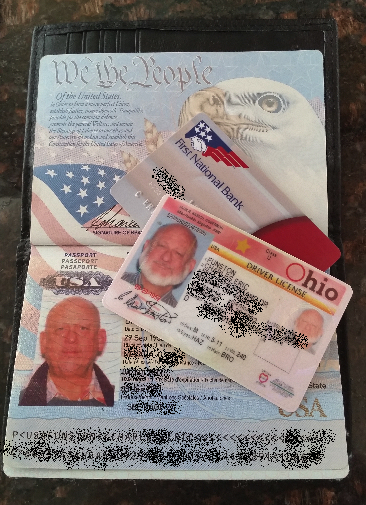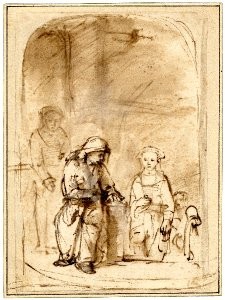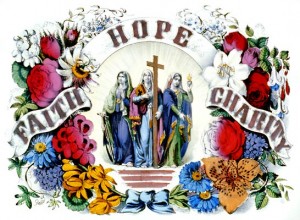====================
A sermon offered on the First Sunday after Epiphany (The Baptism of our Lord), January 10, 2016, to the people of St. Paul’s Episcopal Church, Medina, Ohio, where Fr. Funston is rector.
(The lessons for the day are Isaiah 43:1-7, Psalm 29, Acts 8:14-17, and Luke 3:15-17,21-22. These lessons may be found at The Lectionary Page.)
====================
 We’ve heard this Gospel story before. We all know what happens (at least in the Synoptic Gospels) after Jesus is baptized: a voice is heard from heaven, “You are my Son, the Beloved; with you I am well pleased” (Lk 3:22) and then Jesus goes into the desert for forty days of retreat where he grapples with temptations.
We’ve heard this Gospel story before. We all know what happens (at least in the Synoptic Gospels) after Jesus is baptized: a voice is heard from heaven, “You are my Son, the Beloved; with you I am well pleased” (Lk 3:22) and then Jesus goes into the desert for forty days of retreat where he grapples with temptations.
As Matthew and Mark tell the story, they move immediately from the baptism to the desert. But Luke, who tells of the baptism near the end of Chapter 3 and of the desert retreat at the beginning of Chapter 4 of his Gospel, does something unexpected. After the portion we heard this morning, right after the voice of God is heard declaring the Sonship of Jesus, right at the end of Chapter 3, he adds these verses which (for obvious reasons) are almost never read in worship services:
Jesus was about thirty years old when he began his work. He was the son (as was thought) of Joseph son of Heli, son of Matthat, son of Levi, son of Melchi, son of Jannai, son of Joseph, son of Mattathias, son of Amos, son of Nahum, son of Esli, son of Naggai, son of Maath, son of Mattathias, son of Semein, son of Josech, son of Joda, son of Joanan, son of Rhesa, son of Zerubbabel, son of Shealtiel, son of Neri, son of Melchi, son of Addi, son of Cosam, son of Elmadam, son of Er, son of Joshua, son of Eliezer, son of Jorim, son of Matthat, son of Levi, son of Simeon, son of Judah, son of Joseph, son of Jonam, son of Eliakim, son of Melea, son of Menna, son of Mattatha, son of Nathan, son of David, son of Jesse, son of Obed, son of Boaz, son of Sala, son of Nahshon, son of Amminadab, son of Admin, son of Arni, son of Hezron, son of Perez, son of Judah, son of Jacob, son of Isaac, son of Abraham, son of Terah, son of Nahor, son of Serug, son of Reu, son of Peleg, son of Eber, son of Shelah, son of Cainan, son of Arphaxad, son of Shem, son of Noah, son of Lamech, son of Methuselah, son of Enoch, son of Jared, son of Mahalaleel, son of Cainan, son of Enos, son of Seth, son of Adam, son of God. (Lk 3:23-38)
Why does he do that? Mark doesn’t even bother to give a genealogy and Matthew (who gives us a slightly different list of Jesus’ ancestors) put his genealogy right at the beginning in Chapter 1. So why, do you suppose, does Luke give us a genealogy and plop it down here at the end of the story of Jesus’ baptism, interrupting the narrative flow from baptism to desert to temptation? And why does he call Adam “son of God”?
I posed that question in an online clergy discussion group and some of my colleagues’ responses are these:
“All are ‘sons (and daughters) of God.’ The question is to what degree is Jesus uniquely so? A reboot… a second Adam? (That is, of course, a Biblical concept.) A ‘new’ first born? But we all share that heritage – to what degree? Is the giving of the Spirit in fact a third Genesis of sorts?”
“I always thought Luke’s point in tracing Jesus to Adam, rather than to David or Abraham, was to state that Jesus is universal savior, identified as he is as Son of Adam, rather than (merely) Son of David or son of Abraham.”
“It’s the Creation narrative Lite for Gentile readers — the point being that God is the source of all life.
Those are all good answers and they encapsulate pretty much the scholarly and traditional understandings of why Luke plops the genealogy down in this place, between baptism and temptation: Jesus, only begotten son of God, is contrasted with Adam, the first created son of God, and we as created children of God descended from Adam and as adopted children of God baptized into Jesus share in the nature of both!
We definitely share in the nature of Adam and others listed in this genealogy. Phil Ryken, the president Wheaton College who has recently gotten some bad press for his (in my opinion) wrong decision to discharge a professor who suggested that Christians and Muslims worship the same God, has been quoted as writing this about the men listed in Luke’s genealogy of Jesus:
They were guilty of the same kinds of sins as we are. All these men were sinners. It’s nice to think that our ancestors were noble and good, and that they did something heroic. This is one of the reasons people like to study their family trees. Whether they were heroic or not, the people who came before us were just as deeply flawed as we are. We can infer this from the mere fact that they were human beings, but we can also prove it from the pages of the Bible. Consider some of the skeletons in the family closet as recorded in the Old Testament: Terah, the father of Abraham, was an idolater; Abraham was a liar; Jacob was a cheater and a thief; Judah traded slaves and consorted with prostitutes; David was a murderer and an adulterer. We usually remember these men as heroes, but they were also scoundrels, all the way back to Adam. At the tap root of the family tree, like any genealogy, the one in Luke’s Gospel records a long line of sinners. (Citation unknown; quoted in a sermon published on line.)
I think Dr. Ryken was wrong about firing the professor, but I think he’s right about human nature and “the skeletons in [our] family closet.” Just like these ancestors of Jesus, we all are people who make mistakes, make bad decisions (like wrongfully discharging an instructor), do bad things; we share in the nature of Adam.
My friend Mark Sandlin, an ordained Presbyterian elder in North Carolina, yesterday posted online a part of his sermon for today. He is saying to his congregation:
The Jewish and Christian religious stories are stories underlined with the constant reality of seeking out something, searching for something. Adam and Eve seek out knowledge. Noah seeks shelter from the storm. Abraham and Sarah seek out the unknown land God sends them to. Joseph seeks to understand the king’s dreams and bring his family back together. Moses seeks to bring his people to the promised land. David seeks to become the leader God clearly believes he is. The prophets seek to bring the people of God back to God’s ways. Jesus seeks to show us what love looks like and teach us God’s ways. Paul seeks to grow the church in the ways of God. We are seekers. It is our story. We cannot escape it. We should not try. We Christians are seekers. Always have been. Always will be. It’s in our ancestral DNA. (Posted on Mark’s Facebook page)
Mark might disagree with me if I were to say that he and Dr. Ryken are saying the same thing, but the truth is that often in our seeking, we seek in the wrong places, or we seek the wrong things, and we end up making the bad decisions and mistakes Dr. Ryken describes Jesus’ forebears making. Again, it’s that human nature that we all share with Adam as created children of God.
But from the earliest days of the church, it has been the Christian understanding that we also share in the nature of Jesus. In the second century, Irenaeus, bishop of Lyons (c. 130–202) said that God “became what we are in order to make us what he is himself.” (Against Heresies, Book V, Preface) His contemporary, Justin Martyr (c. 100–165) taught that Christians are “children of the Most High” because, in the beginning human beings “were made like God, free from suffering and death” and, therefore, “deemed worthy of becoming gods and of having power to become sons of the highest.” (Dialogue with Trypho, Ch. 124)
Justin was quoting Psalm 82 in calling us “children of the Most High,” but he might have been quoting our Psalm from today, which (unfortunately) the Prayer Book mistranslates. In the first verse of our gradual for today, Psalm 29, the psalmist commands, “Ascribe to the Lord, you gods, ascribe to the Lord glory and strength.” The Hebrew words translated here as “you gods” are “bene Elohim,” more correctly translated as “sons (or children) of the Almighty.” Psalm 29 is believed to be derived from a very early liturgical hymn extolling the Canaanite god Baal or a similar ancient Near Eastern “storm deity,” and thus addressed originally to “heavenly beings” or lesser gods, but we might understand it to be addressed to us, to those whom God describes in today’s reading from Isaiah:
Do not fear, for I am with you;
I will bring your offspring from the east,
and from the west I will gather you;
I will say to the north, “Give them up,”
and to the south, “Do not withhold;
bring my sons from far away
and my daughters from the end of the earth –
everyone who is called by my name,
whom I created for my glory,
whom I formed and made.”
(Isa. 43:6-7)
We were created for glory, descendants of Adam formed by and made children of God, and our original created goodness is renewed by Jesus in whom we are adopted children of the Most High. No wonder that “in the temple of the Lord all are crying, ‘Glory!’ ”
This, I believe, is why Luke interrupts the flow of action in his telling of the Gospel story, why unlike Mark and Matthew, he doesn’t move directly from baptism to temptation. He finishes the story of Jesus’ baptism and then adds, almost as an explanatory footnote, “O, by the way, this is who this guy is. He’s a human being, just like you; descended from a bunch of fallible, flawed human beings, just like you; a descendent of Adam, the original created son of God, just like you.” Only after offering us that reassurance does Luke go on to tell us about the forty days in the desert, a story in which we learn that there’s something about Jesus that isn’t just like us, that he is able to resist temptation. And the rest of the story (as Paul Harvey used to say on radio) is that through his faithfulness and through our faith in him, we can become (by adoption) just like him. Telling the story in this way – baptism-genealogy-temptation – is Luke’s way of saying that God “became what we are in order to make us what he is himself.”
Thus, it is Luke’s way of underscoring the central message of the Gospel, which we hear in our readings today in the Old Testament lesson: “Do not fear, for I have redeemed you.” (Isa. 43:1) If we had to put the Gospel of Jesus Christ into one phrase, it would have to be, “Don’t be afraid.” It’s what Gabriel said to Mary (Lk 1:30); it’s what the angel said to Joseph (Mt 1:20); it’s what the angels said to the shepherds in Bethlehem (Lk 2:10); it’s the first word the angel spoke on Easter morning: “Don’t be afraid” (Mt 28:5). It is what the risen Christ said to his disciples: “Do not be afraid. I am with you always.” (Mt. 28:10,20)
It’s one thing to say it, however, and it’s another thing to believe it. That, too, is part of the human nature we’ve inherited from Adam; we know all about our ancestors, people like Abraham the liar, Jacob the cheat, and David the adulterer; we know all about how badly they screwed up, and we’re afraid we might do it, too. But remember the words of God, “Do not fear, for I have redeemed you; I have called you by name, you are mine.” (Isa 43:1) Remember that we share not only Adam’s nature, but Jesus’ nature as well.
A well-known theologian once confessed that he was plagued many nights by a terrible dream. He dreamed that he was traveling in some distant city, and he ran into someone with whom he had gone to high school. In the bad dream, the person would say, “Henri, Henri, haven’t seen you in years. What have you done with your life?” This question always felt like judgment. He’d done some good things in his life, but there had also been some troubles and struggles. And when the old schoolmate in the dream would say, “What have you done with your life?” he wouldn’t know what to say, how to account for his life. Then one night he had another dream. He dreamed that he died and went to heaven. He was waiting outside the throne room of God, waiting to stand before almighty God, and he shivered with fear. He just knew that God would be surrounded with fire and smoke and would speak with a deep voice saying, “Henri, Henri, what have you done with your life?” But, then, in the dream, when the door to God’s throne room opened, the room was filled with light. From the room he could hear God speaking to him in a gentle voice saying, “Henri, it’s good to see you. I hear you had a rough trip, but I’d love to see your slides.” (Note: this story has been used by many preachers; I’ve not been able to find an original source.)
I think there is truth in that dream. I think that’s exactly what will happen, that God will say to each one of us, “It’s good to see you! You are my child. I hear you’ve had a rough trip, but I’m pleased with you and I’d love to see your pictures.”
So, don’t be afraid. God has redeemed you; God has called you by name; you are God’s. Just like “. . . Nathan, son of David, son of Jesse, son of Obed, son of Boaz, son of Sala, son of Nahshon, son of Amminadab . . .” and all the rest of them. Just like Adam. And just like Jesus. Amen.
====================
A request to my readers: I’m trying to build the readership of this blog and I’d very much appreciate your help in doing so. If you find something here that is of value, please share it with others. If you are on Facebook, “like” the posts on your page so others can see them. If you are following me on Twitter, please “retweet” the notices of these meditations. If you have a blog of your own, please include mine in your links (a favor I will gladly reciprocate). Many thanks!
====================
Father Funston is the rector of St. Paul’s Episcopal Church, Medina, Ohio.

 A Native American proverb instructs us, “When you were born, you cried and the world rejoiced; live your life in a manner that when you die, the world cries and you rejoice.” Today, on what would have been Sheryl Ann King’s 48th birthday, the world (you and me and everyone who knew and loved Sherry) is crying, but Sherry is rejoicing. “If you loved me,” Jesus told his followers, “you would rejoice that I am going to the Father” (Jn 14:28); we who love Sherry, let us rejoice (even through our tears) that she, too, has gone to the Father.
A Native American proverb instructs us, “When you were born, you cried and the world rejoiced; live your life in a manner that when you die, the world cries and you rejoice.” Today, on what would have been Sheryl Ann King’s 48th birthday, the world (you and me and everyone who knew and loved Sherry) is crying, but Sherry is rejoicing. “If you loved me,” Jesus told his followers, “you would rejoice that I am going to the Father” (Jn 14:28); we who love Sherry, let us rejoice (even through our tears) that she, too, has gone to the Father. Perhaps you’ve heard about the recent advertisement that the Church of England wants to run in cinemas in the United Kingdom. It’s part of a campaign which includes the Church’s new website called
Perhaps you’ve heard about the recent advertisement that the Church of England wants to run in cinemas in the United Kingdom. It’s part of a campaign which includes the Church’s new website called  This morning, after I took the dog for her walk and poured a cup of coffee, I turned on my computer and found a message from my friend Melania, who is from Naples but is currently working in Spain. We were students together in Ireland. This is her message:
This morning, after I took the dog for her walk and poured a cup of coffee, I turned on my computer and found a message from my friend Melania, who is from Naples but is currently working in Spain. We were students together in Ireland. This is her message:  The kingdom of God, of which today we celebrate Christ as king, is not a kingdom of security; it is a kingdom of peace, dangerous peace.
The kingdom of God, of which today we celebrate Christ as king, is not a kingdom of security; it is a kingdom of peace, dangerous peace. The death of anyone important in our lives is a tragic and painful thing, even if the relationship was strained or even broken. This is especially so when a parent dies and, for some reason, more so when that parent is our father, perhaps because we use that metaphor of fatherhood to explain God’s relationship to us. Whenever someone’s father passes away, I cannot help but remember the poem by the Welsh poet Dylan Thomas, Do Not Go Gentle Into That Good Night:
The death of anyone important in our lives is a tragic and painful thing, even if the relationship was strained or even broken. This is especially so when a parent dies and, for some reason, more so when that parent is our father, perhaps because we use that metaphor of fatherhood to explain God’s relationship to us. Whenever someone’s father passes away, I cannot help but remember the poem by the Welsh poet Dylan Thomas, Do Not Go Gentle Into That Good Night: I get letters. Sometimes they’re really nice letters. And sometimes they’re not. Today, I want to tell you about a letter and how it caused me to rethink the two stories of women in today’s lectionary readings: First, the end of the story of Ruth from the biblical book named for her, and second, the story of Jesus watching and commenting upon the sacrificial giving of a widow in the Jerusalem temple.
I get letters. Sometimes they’re really nice letters. And sometimes they’re not. Today, I want to tell you about a letter and how it caused me to rethink the two stories of women in today’s lectionary readings: First, the end of the story of Ruth from the biblical book named for her, and second, the story of Jesus watching and commenting upon the sacrificial giving of a widow in the Jerusalem temple. Last week, I gave away the ending of Job. I told you that everything turned out all right in the end, and so it has. Job has repented, not of any sin that warranted his suffering, but of the pride and arrogance (and ignorance) he displayed during his suffering by demanding to confront God. God has forgiven him and to make up for all his loss, his fortunes have been restored many times over. Happy ending! Except not quite . . .
Last week, I gave away the ending of Job. I told you that everything turned out all right in the end, and so it has. Job has repented, not of any sin that warranted his suffering, but of the pride and arrogance (and ignorance) he displayed during his suffering by demanding to confront God. God has forgiven him and to make up for all his loss, his fortunes have been restored many times over. Happy ending! Except not quite . . . 

